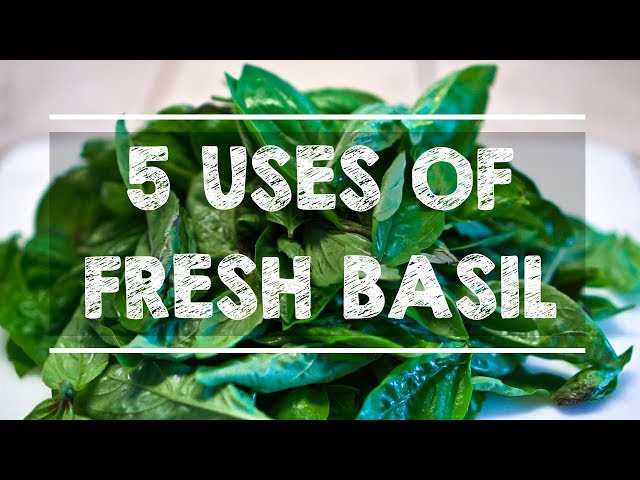Basil is a popular herb known for its strong and distinctive aroma. It is commonly used in Italian cuisine and is an essential ingredient in dishes like pesto sauce and Caprese salad. However, can you actually cook basil? The answer is yes!
While basil is often used as a fresh herb, it can also be cooked to enhance its flavor and incorporate it into various dishes. Cooking basil can help mellow out its intensity and add a unique taste to your recipes.
One way to cook basil is by sautéing it in olive oil. This method infuses the oil with the herb’s flavor and creates a delicious base for pasta sauces or sautéed vegetables. Another option is to use basil as a topping for pizzas or in soups, allowing it to cook and release its aromatic oils.
It’s important to note that cooking basil for too long can diminish its flavor, so it’s best to add it towards the end of the cooking process. This way, you can preserve its delicate taste and aroma. So, the next time you’re cooking up a meal, don’t hesitate to experiment with cooking basil and explore its versatile flavors!
Did you know? Basil is considered a symbol of love and fertility in some cultures. It is also believed to have various health benefits, including anti-inflammatory and antibacterial properties.
Benefits of Cooking with Basil
Basil is not only a popular herb known for its strong aroma and flavor, but it also offers numerous health benefits when used in cooking. Here are some of the benefits of cooking with basil:
1. Rich in antioxidants: Basil contains a high concentration of antioxidants, which help to protect the body against damage from harmful free radicals. By cooking with basil, you can incorporate these powerful antioxidants into your meals and benefit from their protective properties.
2. Anti-inflammatory properties: Basil is known for its anti-inflammatory properties, which can help to reduce inflammation in the body. When used in cooking, basil can help to alleviate symptoms of conditions such as arthritis and asthma.
3. Boosts digestion: Basil has been used for centuries as a digestive aid. It can help to stimulate the production of digestive enzymes, making it easier for the body to break down and absorb nutrients from food. Adding basil to your meals can help to improve digestion and prevent issues such as bloating and indigestion.
4. Supports heart health: Basil contains compounds that have been shown to help lower blood pressure and cholesterol levels. By incorporating basil into your cooking, you can help to support heart health and reduce the risk of cardiovascular diseases.
5. Enhances the immune system: Basil is rich in vitamins A, C, and K, as well as minerals like iron, calcium, and magnesium. These nutrients help to boost the immune system and support overall health. Cooking with basil can help to ensure you’re getting a good dose of these essential nutrients.
In conclusion, cooking with basil not only adds flavor to your meals but also provides a range of health benefits. Whether you’re using it fresh or dried, basil is a versatile herb that can enhance the taste and nutritional value of your dishes.
Enhances Flavor in Dishes

Basil is a versatile herb that enhances the flavor of a wide variety of dishes. Its distinct aroma and taste make it a popular choice in many cuisines around the world.
When added to savory dishes, such as pasta sauces, soups, and stews, basil brings a fresh and earthy flavor. Its slightly minty and peppery undertones add complexity to the dish, making it more interesting and enjoyable.
Basil also complements the flavors of tomatoes, making it a perfect pairing for dishes like caprese salad and bruschetta. The combination of tomato and basil creates a harmonious balance that is both refreshing and appetizing.
Furthermore, basil is often used in marinades and dressings, as it infuses the food with its fragrant and aromatic qualities. Whether it’s a simple vinaigrette or a more complex herb blend, basil adds depth and character to any dressing.
Health Benefits
In addition to its flavor-enhancing qualities, basil also offers numerous health benefits. It is packed with vitamins and minerals, including vitamins A, K, and C, as well as iron, calcium, and magnesium.
Moreover, basil contains powerful antioxidants that help protect the body against damage from harmful free radicals. These antioxidants can contribute to a healthy immune system and reduce the risk of chronic diseases.
Conclusion
When it comes to cooking, basil is an indispensable herb that enhances the flavor of various dishes. Its versatility and health benefits make it a must-have ingredient in any kitchen. So go ahead and add some basil to your favorite recipes to take them to the next level of deliciousness!
Provides Nutritional Value
Basil is not only a versatile and delicious herb, but it also offers a range of nutritional benefits. This herb is packed with essential nutrients that can contribute to a healthy diet.
Basil is a good source of vitamins A, C, and K. These vitamins play important roles in maintaining healthy skin, boosting the immune system, and supporting bone health. Vitamin A is essential for proper vision, while vitamin C is an antioxidant that helps protect the body against free radicals.
In addition to vitamins, basil also contains minerals such as calcium, iron, and magnesium. Calcium is crucial for strong bones and teeth, while iron is necessary for the formation of red blood cells and oxygen transportation. Magnesium plays a vital role in muscle function and energy metabolism.
Furthermore, basil is rich in antioxidants and phytonutrients that have been found to have various health benefits. These compounds help protect against inflammation, promote heart health, and support digestion.
To incorporate basil into your diet, try adding it to salads, soups, sauces, or even making a homemade pesto sauce. Not only will you enhance the flavor of your dishes, but you will also be adding a nutritious ingredient to your meals.
Note: It’s important to consume basil in moderation as part of a balanced diet. If you have any specific dietary concerns or health conditions, consult with a healthcare professional.
Boosts Digestive Health
Basil is not just a fragrant herb that adds flavor to your dishes, it also has numerous health benefits. One of its key benefits is its ability to boost digestive health.
Thanks to its natural compounds, basil can help alleviate various digestive issues. It has been used for centuries in traditional medicine to relieve indigestion, bloating, and gastrointestinal discomfort.
Basil contains enzymes that promote healthy digestion by breaking down proteins and aiding in nutrient absorption. It also helps stimulate the appetite and supports the production of bile, which is essential for the digestion of fats.
Reduces Acidity
Basil is known for its anti-inflammatory properties, making it an effective remedy for reducing acidity and heartburn.
When consumed regularly, basil can help neutralize excess acidity in the stomach, reducing the risk of acid reflux and providing relief from heartburn. It also helps reduce inflammation in the gut, preventing digestive discomfort.
Soothes Stomach Cramps
If you suffer from stomach cramps or gastrointestinal spasms, incorporating basil into your diet can provide relief.
Basil has calming properties that help relax the muscles of the stomach and intestines, reducing spasms and cramps. It can also help relieve stomach pain caused by gas or bloating.
To reap the digestive benefits of basil, you can add it to your meals, prepare herbal teas with fresh basil leaves, or take it in supplement form.
However, it’s important to note that while basil can be beneficial for digestive health, it’s always best to consult with a healthcare professional before using it as a treatment for any digestive issues you may be experiencing.
Offers Natural Anti-Inflammatory Properties

Basil is more than just a delicious herb to add flavor to your dishes; it also offers natural anti-inflammatory properties. The essential oils found in basil, such as eugenol, linalool, and citronellol, have been found to have anti-inflammatory effects in the body. These compounds can help reduce inflammation, which is often the root cause of many chronic diseases.
Research has shown that basil may be particularly beneficial in reducing inflammation associated with conditions such as arthritis and inflammatory bowel diseases. The anti-inflammatory properties of basil can help alleviate symptoms such as joint pain, swelling, and gastrointestinal discomfort.
Additionally, basil contains high levels of antioxidants, which also contribute to its anti-inflammatory properties. Antioxidants help protect the body against oxidative stress, which can lead to inflammation and damage to cells and tissues.
Adding basil to your meals on a regular basis can be a simple and delicious way to incorporate this natural anti-inflammatory herb into your diet. Whether you use fresh basil leaves in salads and pasta dishes or sprinkle dried basil over roasted vegetables, you can enjoy the benefits of its anti-inflammatory properties.
Supports Heart Health
Basil is not only a flavorful herb but also a beneficial addition to a heart-healthy diet. It contains a compound called eugenol, which has been shown to help lower blood pressure levels and improve cardiovascular health.
Furthermore, basil is rich in antioxidants that can help reduce inflammation in the body and prevent cell damage. This can be particularly beneficial for heart health, as chronic inflammation has been linked to an increased risk of heart disease.
In addition, basil contains magnesium, a mineral that plays a crucial role in maintaining a healthy heart rhythm and preventing abnormal blood clotting. It also helps to relax blood vessels, which can improve blood flow and reduce the risk of cardiovascular diseases.
To incorporate basil into your heart-healthy diet, you can add it to salads, soups, sauces, or use it as a garnish for various dishes. Its distinct aroma and flavor will enhance the taste of your meals while providing numerous health benefits.
Questions and answers
Can you cook basil?
Yes, basil can be cooked in a variety of ways. It is commonly used in Italian cuisine as a key ingredient in pesto sauce, or it can be added to soups, stir-fries, and pasta dishes. It can also be used as a topping on pizzas and in salads.
What are some popular dishes that use cooked basil?
Some popular dishes that use cooked basil include Caprese salad, Margherita pizza, tomato basil soup, and pasta dishes like spaghetti alla puttanesca or penne arrabbiata. Basil adds a fresh and aromatic taste to these dishes.
Is it better to cook basil or use it fresh?
It depends on personal preference and the dish you are making. Fresh basil is known for its vibrant flavor and aroma and is commonly used as a garnish or in salads. However, cooking basil can also bring out its flavor and infuse it into the dish, adding a different dimension to the taste. It is best to experiment and see which method you prefer.
How do you cook basil without losing its flavor?
To cook basil without losing its flavor, it is best to add it towards the end of the cooking process. This way, the basil retains its fresh and aromatic taste. Overcooking basil can cause it to lose its flavor, so it is important to be mindful of the cooking time when using basil in dishes.
Can you freeze cooked basil?
Yes, you can freeze cooked basil. However, freezing can alter the texture of the basil leaves, so it may not be as fresh and crisp after thawing. It is best to freeze cooked basil in small portions, such as in ice cube trays with some olive oil, and use it as a flavoring agent in sauces or soups.






